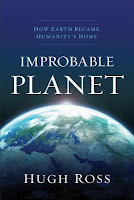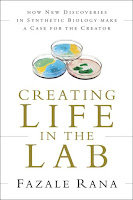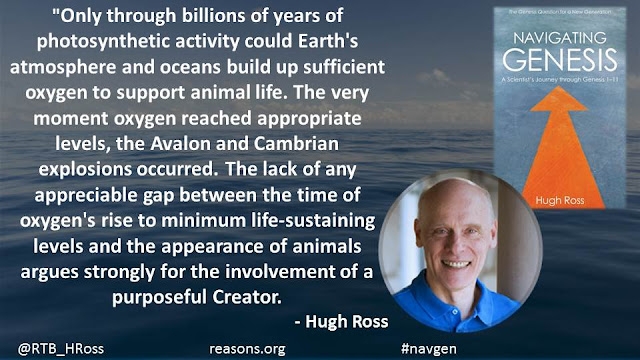One of the major challenges to the Christian worldview is the idea that science and Christianity are necessarily in conflict with one another. This general challenge is manifested in many different ways. A few months ago, I posted my
Top 5 Books that address the Genesis controversy. This list will address the more general challenge. As before, I will give the list then provide a short explanation for my choices. This list will consist of two primarily philosophical books and two primarily scientific books that are bridged by one that logically connects the philosophy to the science. So, on to the list of my (currently) Top 5 Books I recommend regarding science and faith:
Why Did I Pick These Books?

In order for discovery and explanation (science) to even take place, a proper philosophy of knowledge (epistemology) must be established. As mentioned in the introduction, many skeptics claim that science (read "evolution") and Christianity are in direct opposition to one another, and they offer that naturalism is the only view supported by science (again, read "evolution"). In this book, philosopher Alvin Plantinga looks at the theory of evolution from a merely conceptual standpoint (not an evidential one- Plantinga does not agree or disagree with evolutionary mechanisms in this book). He makes the case that the theory of evolution, by itself, merely describes a possible mechanism to explain the diversity of life, but it does not make any claims about whether that mechanism was guided or not- philosophical naturalism has to be sneaked into evolutionary theory for guidance to be excluded. He concludes that evolution is compatible with theism, so there is no conflict. But he takes it even further. C.S. Lewis argued in "Mere Christianity" that a naturalistic origin of our brains justifies doubting its ability to reason and come to true conclusions apart from survival advantage. Plantinga builds upon Lewis' argument to place it on very strong scientific grounds. He ultimately concludes that a conflict does exist between evolution and naturalism. Not only are naturalists incorrect in claiming a conflict between Christianity and science, they are incorrect in claiming concord between science and naturalism. Naturalism is simply not a viable worldview for the person who values their ability to reason towards true conclusions despite survival disadvantages of those conclusions.

For reasoning independent of survival advantage to take place, a mind that is not subject to the survival of a physical organism must exist (an agent). Naturalism not only does away with the reliability of a brain's ability to reason independent of survival advantage, it also has no room for an agent independent of the physical organism. Naturalists have attempted to explain away agency (along with free will, intentionality, design, and other concepts we take for granted) using strong and weak agent reduction. Philosopher Angus Menuge takes the reader through the scientific and philosophical claims of these proposed solutions and shows how each of them fails the test of reality. He also takes the scientific and philosophical evidence to build the case for agency (minds) actually existing. If minds do exist, then naturalism is false, and we have discovered yet another conflict between naturalism and science. Along with that, science has actually demonstrated a key feature of the Christian worldview: more than just this physical world exists.

The two previous books focused primarily on philosophical arguments that have scientific implications. But what about scientific evidence that has philosophical implications? Before we can get to the more science-focused evidence for Christianity, we need to establish the reliability of nature as a source of knowledge that we can observe and analyze. In their book "Origin Science" philosophers Norman Geisler and Kerby Anderson do just that. They look at the history of science and the history of science within the Church (drawing the conclusion that science and Christianity are compatible). They then look at how knowledge of how nature currently operates has been obtained: through observation. This connects our ability to accurately observe and validly analyze to draw sound conclusions about how nature operates today (observational science). But what about how nature operated in the past? Using the principle of uniformity (
distinct from uniformitarianism) Geisler and Anderson demonstrate that the past can be known with deductive certainty. This makes the connection between the present and the past. If the past operated the same five days ago (verified by repeated experiments), we can keep adding five days to the past until we reach back into the distant past to discover how things operated back then (historical science). The knowledge of the present operation of nature and the truth of the principle of uniformity necessarily imply that we can know the operation of nature in the (distant) past. Thus, our ability to know and nature as a source of knowledge have been connected so that we can discover what nature reveals about its purposeful or purposeless history.

For several decades, astrophysicist Dr. Hugh Ross has been scouring scientific journals for scientific evidence for the Christian worldview. The evidence is so frequently in the scientific literature that he has a blog entitled "Today's New Reason to Believe." He has written several books on what he has discovered, but his latest book examines history of our planet, and the hallmark of design for a purpose is difficult to miss. As scientists discover more about how stars, solar systems, and planets are formed, they see just how unique ours is. Numerous features of each are necessary for our planet to be able to support advanced life for the time that it has. For those familiar with Gantt Charts (used to track the progress of large and complex projects), through the entire time span of the project of the creation of our planet for high tech civilization, numerous series of highly orchestrated simultaneous phases begin and conclude at precisely coordinated times. The completion of the project is so dependent upon the plan being followed precisely that every phase, if not started or not completed at their precise time, ensures that the project will be a failure. While many projects must be flexible due to circumstances outside the project manager's control, the Project Manager in charge of our planet did not have that limitation; He was in complete control and could easily complete such a strict project. We know by analogy to human projects that when we see such a complex system come together with a specific end result that it is the product of a designer (project manager). While an argument against a naturalistic explanation would be obvious, Dr. Ross instead argues that the design of our planet positively identifies that it was created for a purpose, and a purpose must have a Purposer. Dr. Ross argues that the most plausible explanation for our planet's sustaining a high tech civilization is the product of the divine Project Manager (God), who's purpose was the redemption of as many of His
Image bearers as possible.

While the previous book focused on evidence from astrophysics and geochemistry for our planet being created with a purpose (thus a Purposer was necessary), Creating Life In The Lab examines the latest work in the field of biochemistry, specifically what scientists are doing in order to create life. Dr. Rana takes the reader through the history and current state of different approaches scientists have been pursuing to create life. He explains that precisely and constantly controlled environmental conditions are necessary even for the progress that has been made today. Just like with other chemical experiments, these are highly controlled reactions, ones that would not take place outside the intervention of the scientists. And much like other chemical experiments, the reactions must be stopped at precise times to prevent destruction of the product of the reaction. Dr. Rana points out that these experiments and all success they have can only be attributed to the fact that designers (the scientists) are behind the experiments with an explicit purpose in mind. The fact that the scientists have a specific goal in mind allows them to begin chemical reactions, allow them to take their natural course (according to the laws of physics) then intervene to stop the reactions to prevent destruction of the products and set them aside to be later combined with other products of similar processes. Dr. Rana makes the point that even if there is a naturalistic pathway from non-life to life, that pathway is not one that can be traversed without designers to control the conditions, start and stop reactions, and combine products that have each been created independently. He also argues that when we see products of any other process that requires precisely controlled conditions and controlled chemical reactions (say, the device you are using to read this article), we intuitively, logically, and experientially know that it is the product of a designer. Even though life has not yet been successfully created in the lab, the current status provides powerful evidence for life being the product of a Designer. And if (when) life is created in the lab, it will present powerful, positive evidence for the creation of life absolutely requiring a designer.
Bringing It All Together
I would like to add also that these last two books offer such powerful cases for design that if naturalism were true, they would actually bolster Alvin Plantinga's argument in "
Where The Conflict Really Lies" with scientific evidence. If the "design" we see in the history of our planet and the creation of life is merely an appearance of design (as many naturalists contend), then arguments for true design break down. And as Dr. Angus Menuge argued in "
Agents Under Fire" that breakdown is in the very concept of design- it does not exist if naturalism is true. Everything that we experience and believe to be designed (even human inventions and projects) are not truly designed; the belief that they are designed is merely a useful fiction. And since believing these useful fictions is necessary for us to even get out of bed and eat breakfast (not to mention driving [or walking] to work to perform a series of tasks designed to accomplish several purposes) there is no reason whatsoever to think that our brains were selected for by natural selection to believe what is true- they haven't been and they won't be...interestingly, if we cannot trust our brains to believe what is true (possess knowledge), then what is the point of science in the first place? If God does not exist, neither does knowledge, and every knowledge discipline that we enjoy is the product of yet another series of useful fictions forced on us by our (naive?) desire to survive.
























